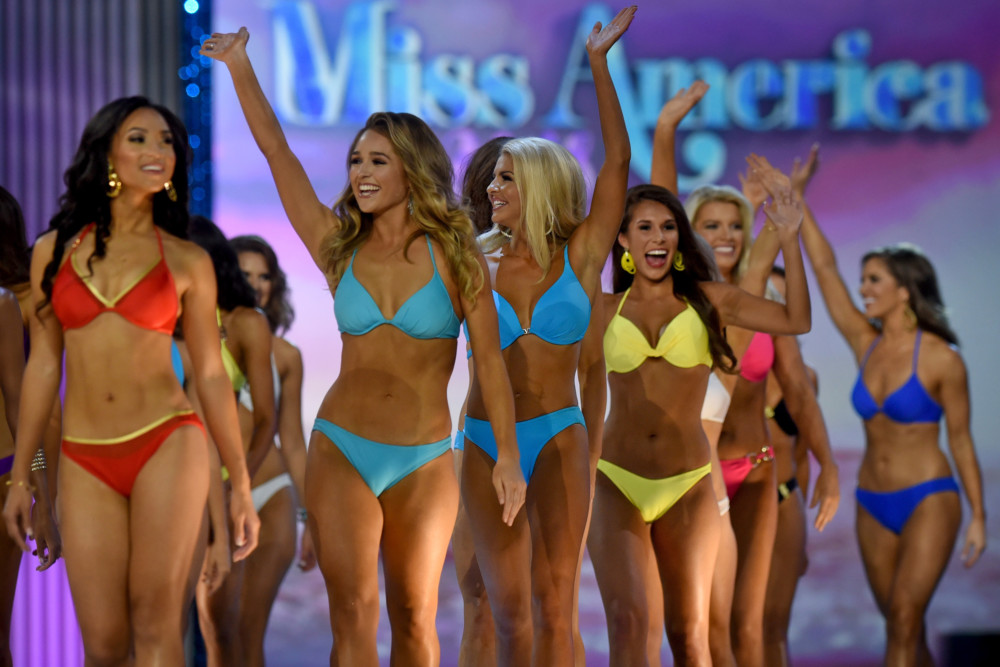By Heidi Stevens
Chicago Tribune
WWR Article Summary (tl;dr) Columnist Heidi Stevens takes a look at what changes could be on the way for the Miss America Pageant. One of Steven’s suggestions is quite interesting, she says, “Why not lift the ban on married and/or mothering Miss Americas? Before 1999, contestants had to swear they’d never been married or pregnant. Starting with the 2000 pageant, contestants have had to swear they’re not currently married, pregnant or the adoptive or biological parent of a child.”
Chicago Tribune
Two former pageant contestants touched Miss America’s third rail, the swimsuit competition, on “Good Morning America” recently, hinting at what, I hope, is the start of a bold, honest discussion about keeping the beauty behemoth relevant.
“Good Morning America” host Amy Robach, runner-up for Miss Georgia in 1995, was interviewing Gretchen Carlson, Miss America 1989.
“Is the idea of a successful young woman parading around in a swimsuit onstage to be judged by her physical appearance, which you and I both subjected ourselves to, is that outdated?” Robach asked Carlson.
“Amy, I have so many great ideas for this organization,” answered Carlson, who was named chairwoman of Miss America’s board of directors this week after three executives resigned in the wake of vulgar, derogatory emails about former winners that were made public. (Carlson is also the former Fox News anchor who filed the sexual harassment lawsuit against Fox Chairman Roger Ailes that ultimately led to his departure.)
“Please stay tuned,” Carlson said. “Because I plan to make this organization 100 percent about empowering women.”
“Changes are coming,” Robach replied.
“Changes are coming,” Carlson agreed.
“Big changes,” Robach prodded.
“Potentially big changes,” Carlson answered.
If the swimsuit competition goes the way of the dinosaurs, I won’t shed any tears. But I have to say, I find the singular focus on that portion of the competition to be a little curious.
Network executives parade successful young women around in swimsuits, or less, on all sorts of stages: Cheerleaders at NFL games. Cheerleaders at NBA games. Victoria’s Secret models in an annual “fashion show.”
On “The Bachelor,” successful young women parade in and out of hot tubs competing for a husband. At least Miss America wins a scholarship.
If Carlson and her board and yet-to-be-named CEO decide to 86 the swimsuits, great. Maybe that decision would inspire soul-searching in other organizations. (“Hmm. I suppose allowing cheerleaders to cover their midriffs in December won’t completely deplete fan morale.”)
But I don’t think it’s a must. If Carlson truly wants the organization “100 percent about empowering women,” I’d love to see her think bigger than the swimsuit competition.
For example, why not lift the ban on married and/or mothering Miss Americas? Before 1999, contestants had to swear they’d never been married or pregnant. Starting with the 2000 pageant, contestants have had to swear they’re not currently married, pregnant or the adoptive or biological parent of a child.
Contestants are young, 17-24, which, statistically, isn’t a demographic that’s married or parenting in huge numbers. But if a young woman happens to have met and committed to the man or woman of her dreams and/or started a family, I don’t see why that’s grounds for disqualification.
Are we pretending unwed/without children means virginal? Eww. Is Miss America more appealing to the masses when she’s still on the market? Eww. Will Miss America’s travel obligations take her away from her domestic duties as a wife/mother? Again, eww.
The interview portion could also use some tweaking. Why, for example, did 2017 hosts ask Miss Missouri, “There are multiple investigations into whether Trump’s campaign colluded with Russia on the election. Well, did they? You’re the jury: guilty or innocent, and please explain your verdict.”
For starters, she’s not the jury. For enders, her answer informs or sways no one. (“Right now, I’d have to say innocent because not enough information has been revealed. We’re still investigating this, and I think we should investigate it to its fullest extent.”) Nor should it. She’s not vying to become FBI director.
What about asking contestants to name a problem facing girls or women in the United States or the world and how they’ll use their time as Miss America to combat it? The contestants would all get the same question, so they’ll have time to research and rehearse their response. Beauty pageant contestants often have wildly impressive community service resumes; why not use the interview portion to let them flex those muscles?
“I’m looking at this as a call of duty,” Carlson told Robach.
Based on what she said next, I have high hopes for how she’ll answer that call.
“Currently, the board is made up, the majority of us, are all former Miss Americas,” she said. “I find that incredibly empowering in this MeToo movement, that some of the women who were allegedly maligned in those appalling emails are now running the place.
“When I jumped off my cliff on the whole sexual harassment story 18 months ago, that was a lonely experience,” she continued. “Look at what happened when that gift of courage kept being passed on to one woman to another to another. We formed a collective voice, and look where we are today. In a tsunami.
“The same thing will happen,” she said, “with the Miss America organization.”
Like America itself, the Miss America pageant has an imperfect history, especially on race. Contestants had to be “of the white race” until 1940. The first Jewish Miss America was pressured to change her last name, Myerson, to sound less Jewish. (She refused.)
I’m intrigued by a leader who approaches the pageant like a work in progress _ and sees change as analogous to that progress.
Here she comes: the new, more empowered Miss America. I hope.














































































































































































































































































































































































